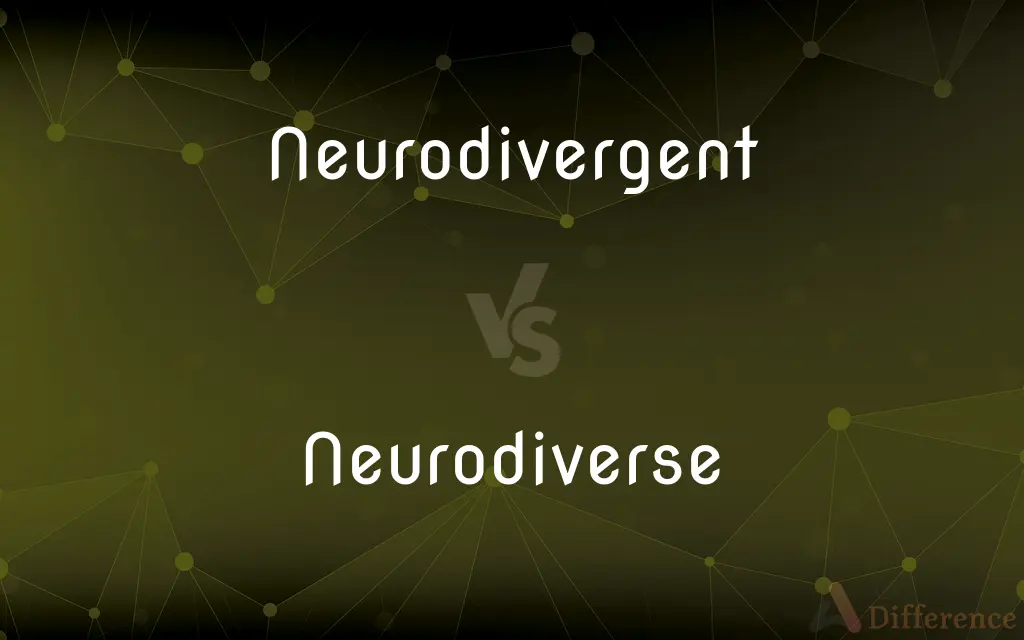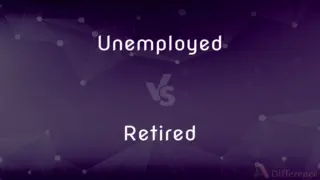Neurodivergent vs. Neurodiverse — What's the Difference?
By Urooj Arif & Maham Liaqat — Updated on April 7, 2024
Neurodivergent refers to individuals with neurological differences like ADHD or autism, while neurodiverse describes a group or community with a range of neurological variations.

Difference Between Neurodivergent and Neurodiverse
Table of Contents
ADVERTISEMENT
Key Differences
Neurodivergent is a term used to describe individuals whose neurological development and functioning differ from societal standards, often including conditions such as ADHD, autism spectrum disorders, dyslexia, and others. Neurodiverse, on the other hand, is a term that refers to a group or community in which there is a range of neurological differences present. It is not used to describe individuals but rather environments or collectives where there is diversity in neurological functioning.
The distinction between neurodivergent and neurodiverse is significant, as it differentiates between the individual and the collective. Understanding this distinction is crucial in discussions about inclusion, diversity, and the neurodiversity movement. By acknowledging and valuing neurological differences, society can move towards greater acceptance and support for individuals who are neurodivergent, creating environments that are truly neurodiverse.
Both terms contribute to changing perceptions around neurological differences, challenging the notion of what is considered "normal" and advocating for a broader understanding of human cognitive and behavioral diversity. This shift in perspective is essential for creating more inclusive communities, workplaces, and educational settings where everyone's unique strengths and challenges are recognized and accommodated.
The relationship between being neurodivergent and belonging to a neurodiverse group highlights the importance of collective acknowledgment and support for diversity in neurological functioning. As society continues to embrace these concepts, the potential for innovation, creativity, and mutual understanding in neurodiverse environments increases, benefiting everyone involved.
Comparison Chart
Definition
Describes individuals with neurological differences from societal norms.
Describes a group or community with a range of neurological variations.
ADVERTISEMENT
Focus
Individual
Group or collective
Examples
ADHD, autism spectrum disorders, dyslexia
Classrooms, workplaces, or communities with members who are neurodivergent
Root Concept
Neurodiversity movement
Diversity in neurological functioning
Application
Used to identify individuals with specific neurological profiles
Used to describe environments or collectives that include a variety of neurological profiles
Compare with Definitions
Neurodivergent
Pertaining to individuals with differences in brain function.
A neurodivergent person might have autism or ADHD.
Neurodiverse
A group or setting with diverse neurological conditions.
Neurodiverse workplaces embrace various thinking styles.
Neurodivergent
Individual aspect of neurodiversity.
Being neurodivergent affects how one interacts with the world.
Neurodiverse
Promotes inclusivity and diversity in neurological functioning.
Neurodiverse communities are leading the way in inclusion.
Neurodivergent
Reflects variation from typical neurological development.
Neurodivergent students may require different learning strategies.
Neurodiverse
Encompasses a wide range of brain functions within a community.
A neurodiverse classroom includes students with and without neurological differences.
Neurodivergent
Recognizes personal neurological diversity.
Neurodivergent artists often bring unique creativity to their work.
Neurodiverse
Values contributions from all members, including neurodivergent individuals.
Neurodiverse teams often excel in creativity and problem-solving.
Neurodivergent
Not a deficit, but a variation.
Many neurodivergent individuals have unique talents and perspectives.
Neurodiverse
Collective aspect of neurodiversity.
Creating a neurodiverse environment requires understanding and accommodation.
Neurodivergent
Having a neurodevelopmental disorder, especially autism spectrum disorder
Neurodivergent students.
Neurodiverse
Of a person: exhibiting neurodiversity; varying in mental configuration from others, especially being on the autism spectrum; of a group: made up of neurodivergent people.
Neurodivergent
Relating to or characteristic of people who have a neurodevelopmental disorder, especially autism spectrum disorder
Neurodivergent behavior.
Neurodiverse
Of or pertaining to neurodivergent people or groups.
Neurodivergent
Having an atypical neurological configuration.
Common Curiosities
How is neurodiverse different from neurodivergent?
Neurodiverse describes a group or setting that includes a variety of neurological conditions, emphasizing collective diversity, whereas neurodivergent refers to the individual differences.
Can a person be neurodiverse?
The term "neurodiverse" applies to groups or settings, not individuals. A person is described as neurodivergent.
Does being neurodivergent affect learning?
Neurodivergent individuals may have unique learning needs and strengths, requiring tailored educational approaches.
What are the benefits of a neurodiverse environment?
Such environments foster innovation, creativity, and problem-solving by incorporating diverse perspectives and talents.
Why is the concept of neurodiversity important?
It promotes understanding, acceptance, and inclusion of all neurological differences, recognizing that such diversity benefits society.
What does neurodivergent mean?
It refers to individuals whose neurological development and functioning diverge from the dominant societal standards, often due to conditions like ADHD or autism.
How can society support neurodivergent individuals?
By providing accommodations, understanding diverse needs, and celebrating neurological differences as aspects of human diversity.
Can neurodivergence be diagnosed?
Conditions associated with neurodivergence, like autism or ADHD, can be diagnosed by healthcare professionals.
How can workplaces become more neurodiverse?
By adopting inclusive hiring practices, accommodating different neurological needs, and valuing diverse perspectives and skills.
Is neurodiversity a movement or a theory?
The neurodiversity movement advocates for the rights and inclusion of neurodivergent individuals, based on the theory that neurological differences are natural variations within the human population.
Share Your Discovery

Previous Comparison
Lek vs. Lol
Next Comparison
Unemployed vs. RetiredAuthor Spotlight
Written by
Urooj ArifUrooj is a skilled content writer at Ask Difference, known for her exceptional ability to simplify complex topics into engaging and informative content. With a passion for research and a flair for clear, concise writing, she consistently delivers articles that resonate with our diverse audience.
Co-written by
Maham Liaqat













































